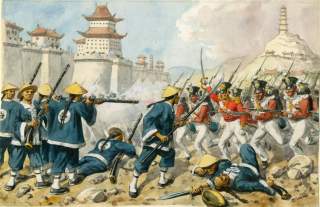The West May Have Forgotten The Opium Wars, But China Hasn't
China will never its humiliation at the hands of the West.
It then spent an entire year looting Beijing, Tianjin and the surrounding countryside in reprisal.
‘Century of Humiliation’:
It’s hard to over-emphasize the impact of the Opium Wars on modern China. Domestically, it’s led to the ultimate collapse of the centuries-old Qing Dynasty, and with it more than two millennia of dynastic rule. It convinced China that it had to modernize and industrialize.
Today, the First Opium War is taught in Chinese schools as being the beginning of the “Century of Humiliation” — the end of that “century” coming in 1949 with the reunification of China under Mao. While Americans are routinely assured they are exceptional and the greatest country on Earth by their politicians, Chinese schools teach students that their country was humiliated by greedy and technologically superior Western imperialists.
The Opium Wars made it clear China had fallen gravely behind the West — not just militarily, but economically and politically. Every Chinese government since — even the ill-fated Qing Dynasty, which began the “Self-Strengthening Movement” after the Second Opium War — has made modernization an explicit goal, citing the need to catch up with the West.
The Japanese, observing events in China, instituted the same discourse and modernized more rapidly than China did during the Meiji Restoration.
Mainland Chinese citizens still frequently measure China in comparison to Western countries. Economic and quality of life issues are by far their main concern. But state media also holds military parity as a goal.
I once saw a news program on Chinese public television boasting about China’s new aircraft carrier Liaoning — before comparing it to an American carrier. “They’re saying ours is still a lot smaller,” a high school student pointed out to me. “And we have only one.”
Through most of Chinese history, China’s main threat came from nomadic horse-riding tribes along its long northern border. Even in the Cold War, hostility with the Soviet Union made its Mongolian border a security hot spot. But the Opium Wars — and even worse, the Japanese invasion in 1937 — demonstrated how China was vulnerable to naval power along its Pacific coast.
China’s aggressive naval expansion in the South China Sea can be seen as the acts of a nation that has succumbed repeatedly to naval invasions — and wishes to claims dominance of its side of the Pacific in the 21st century.
The history with opium also has led China to adopt a particularly harsh anti-narcotics policy with the death penalty applicable even to mid-level traffickers. Drug-trafficking and organized crime remain a problem, however. The explosion of celebrity culture in China has also led to punitive crackdowns on those caught partaking in “decadent lifestyles,” leading to prominent campaigns of public shaming.
For example, in 2014 police arrested Jaycee Chan, son of Jackie Chan, for possessing 100 grams of marijuana. His father stated he wouldn’t plead for his son to avoid imprisonment.
Past history does not always determine future actions. Chinese sentiments toward the United Kingdom today are generally positive despite the Opium Wars. The escalating military confrontation over the South China Sea is a reality of our times, but that doesn’t mean China’s leaders will forever be committed to a strategy of expansion and confrontation.
Nonetheless, fostering better relations requires that we understand how China’s current foreign policy has it roots in past encounters with the West.
Image: Wikipedia.

